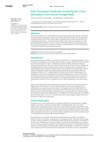 September 2024 in “Journal of the American Academy of Dermatology”
September 2024 in “Journal of the American Academy of Dermatology” Dermatologists can detect smaller hair density changes than previously thought.
 August 2024 in “Journal of Cosmetic Dermatology”
August 2024 in “Journal of Cosmetic Dermatology” Injectable treatments can effectively and safely improve hair growth in adults with androgenetic alopecia.

Alopecia areata patients show increased inflammation and OX40 activation, suggesting a new treatment target.
 August 2024 in “Dermatological Reviews”
August 2024 in “Dermatological Reviews” Stem cells, PRP, and exosomes show promise in treating skin conditions but face regulatory and safety challenges.
 July 2024 in “New Phytologist”
July 2024 in “New Phytologist” PDF2 senses specific lipids and regulates root growth and gene expression in Arabidopsis.
 July 2024 in “JAAD Case Reports”
July 2024 in “JAAD Case Reports” Corticosteroid injections for hair loss may cause eye problems, so caution is needed.
 July 2024 in “Frontiers in Bioengineering and Biotechnology”
July 2024 in “Frontiers in Bioengineering and Biotechnology” Storing nanofat at -20°C for 7 days does not harm its ability to regenerate.
 June 2024 in “British Journal of Dermatology”
June 2024 in “British Journal of Dermatology” Misinformation about alopecia is common online and can harm patient choices.
 June 2024 in “Bőrgyógyászati és Venerológiai Szemle”
June 2024 in “Bőrgyógyászati és Venerológiai Szemle” New treatments for hair loss, like JAK inhibitors, PRP, anti-androgens, and minoxidil, offer better options.
 June 2024 in “International journal of impotence research”
June 2024 in “International journal of impotence research” The author had undisclosed conflicts of interest related to the original article on post-finasteride syndrome.
 May 2024 in “JAMA Dermatology”
May 2024 in “JAMA Dermatology” Oral contraceptive use may increase the risk of frontal fibrosing alopecia in women with a specific CYP1B1 gene variant.
 May 2024 in “Deleted Journal”
May 2024 in “Deleted Journal” Cancer treatments can cause hair loss, but it is often reversible and can be managed with scalp cooling and support.
May 2024 in “IntechOpen eBooks” More oxygen isn't always better and can sometimes be worse.
 May 2024 in “European urology focus”
May 2024 in “European urology focus” Drugs for prostate enlargement and hair loss were not linked to increased risk of depression or suicide.
April 2024 in “Journal of the American Academy of Dermatology” March 2024 in “Journal of the American Academy of Dermatology” March 2024 in “Journal of the American Academy of Dermatology”  March 2024 in “Authorea (Authorea)”
March 2024 in “Authorea (Authorea)” Using lyopreserved umbilical tissue allograft may improve healing and reduce recurrence of pilonidal cysts.
 March 2024 in “EMBO molecular medicine”
March 2024 in “EMBO molecular medicine” Antiviral drugs, especially daclatasvir, may be a new treatment for a rare skin disease, improving survival and reducing symptoms in mice.
March 2024 in “International journal of molecular sciences” Meibomian glands are highly specialized and differ significantly from other sebaceous glands in structure and function.

A thorough diagnostic process and teamwork are crucial for managing complex hyperandrogenism in postmenopausal women.

The document concludes that more standardized research is needed to understand exosome therapy's safety and effectiveness for hair loss treatment.
 February 2024 in “Curēus”
February 2024 in “Curēus” Prompt diagnosis and treatment of hair tourniquet syndrome involving the uvula are crucial to prevent severe complications.
 January 2024 in “Journal of lipid research”
January 2024 in “Journal of lipid research” Finasteride may lower cholesterol and slow heart disease progression.
 January 2024 in “Journal of the American Academy of Dermatology”
January 2024 in “Journal of the American Academy of Dermatology” The document concludes that more research is needed to confirm if COVID-19 vaccines cause a type of hair loss called alopecia areata.
 December 2023 in “Curēus”
December 2023 in “Curēus” COVID-19 vaccination does not significantly increase the risk of developing alopecia areata.
 November 2023 in “European medical journal. Dermatology”
November 2023 in “European medical journal. Dermatology” PRP can reduce pain and improve function, but more standardized research is needed.
 November 2023 in “Journal of plant nutrition and soil science”
November 2023 in “Journal of plant nutrition and soil science” Boron deficiency in maize affects leaf boron levels and nutrient uptake differently depending on root hair presence and soil type.
 November 2023 in “Journal of animal science/Journal of animal science ... and ASAS reference compendium”
November 2023 in “Journal of animal science/Journal of animal science ... and ASAS reference compendium” Pig hair cortisol levels are inheritable and linked to stress responses, which could help select for more resilient pigs.
 November 2023 in “The journal of investigative dermatology/Journal of investigative dermatology”
November 2023 in “The journal of investigative dermatology/Journal of investigative dermatology” OR-101 shows promise for treating alopecia areata by improving hair growth.

























